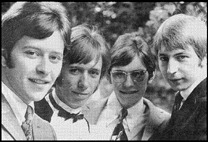
The original Johnny and the Copycats
Rob Lawson, Iain Lyon, John Stewart, Billy Cameron
Another change was the name, taken from the "Watkins Copycat" echo unit. With the tradition of putting the singer's name first, they became Johnny & the Copycats.
Elgin promoter Albert Bonici gave the band regular bookings, one of which was the Longmore Hall, Keith, supporting a little known Liverpool group called the Beatles. But the "Love Me Do" boys were stuck in snow somewhere down south. The two groups, however, would appear together the following year, but in very different circumstances.
During 1963 they supported Eden Kane and the Nashville Teens in the north-east. They came first in a national beat contest in Perth, going on to London for the finals, where the judges, Heinz, Bert Weedon, and Joe Brown awarded them 2nd place. They decided to take a chance and go full-time.
The Cats played central Scotland in 1964, with Johnny Kidd & the Pirates, the Ronettes, and the Hollies. In London their first record, I'm a Hog For You, appeared. Then came the "big" one, opening for the Beatles in the ABC, Edinburgh, and the Odeon, Glasgow. After opening the show for Billy J Kramer & the Dakotas at Aberdeen's Capitol, came a month's tour of England. 1964 saw them turn eighteen, so now they could get German work permits and supported the Searchers in Cologne and Frankfurt later that year. Returning home for the summer, they appeared with Herman's Hermits, Sandi Shaw, and Adam Faith and the Roulettes.
In 1966, they supported the Mindbenders, the Moody Blues, and Cliff Bennet & the Rebel Rousers. At the Top Ten club, Hamburg, the Easybeats offered to record them in London. A deal was fixed, and the song Elusive Face, written by John, was released, followed by Stop, Stop, There I'll Be, with their new name, My Dear Watson on the EMI Parlophone label.
Meanwhile, in Scotland, My Dear Watson provided support to Pink Floyd, Geno Washington and the Small Faces. In 1969 John left the band, but continued to write many of their songs. In 1970, My Dear Watson were invited to DJM studios to record an LP and single. Also there was another young hopeful, Reg Dwight, who was invited to play keyboards and vocals on the single Have You Seen Your Saviour, and flip-side White Line Road. Young Reg would change his name to Elton John, record Your Song, and the rest, as they say, is history.
In 1970, My Dear Watson were joined by Siggi Slater on keyboards, playing all over the country, including Elgin town hall with D.J. Emperor Rosko. On visits home they played support to the Alan Price Set, the Troggs, Manfred Mann, the Jack Bruce Band, Fleetwood Mac, and Status Quo. But the boys decided to call it a day on Saturday 2nd of September, 1972, playing their last official gig at the Fulmar club, RNAS Lossiemouth.
Since then, the Copycats, with Lawrie Higgins on bass, have regularly played charity events around the north east of Scotland.